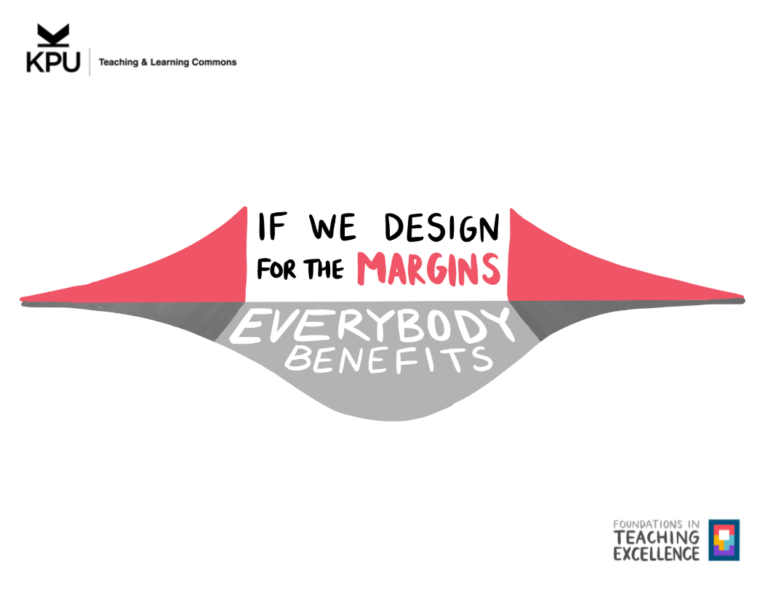Overcoming the Challenge of Implicit Expectations
You’ve designed a major assignment or project that challenges your students and allows them the opportunity to integrate their learning. You’ve been intentional about selecting relevant topics. You’re excited to see the results of your students’ work. And then it happens – the assignments come in, and you realize that many students have missed the mark. You struggle through the process of grading, questioning how to fairly assess these assignments that are so different from what you expected to receive.
The scenario above is not uncommon! When we see students struggling to meet the learning outcomes of our courses, we then begin choosing what story to tell about our courses, our teaching, and our students. A common story is that our students are underprepared for our courses, or that they lack sufficient skills to succeed in postsecondary education. We might respond by searching for ways to provide remedial instruction. Are there any other stories that we might tell ourselves, stories that might lead to a new approach that proactively pre-empts some of our students’ struggles on assignments?
One of the possible alternative stories that can help us move forward is the concept of academic literacies (Lea & Street, 1998). Academic literacies are a set of skills and practices that need to be learned in order to participate in an academic community; they include the ability to read academic literature, evaluate ideas through the lenses of a specific discipline, and produce knowledge, whether in writing or digital forms (Kelly-Laubscher & Van der Merwe, 2014; Wingate, 2018). Academic literacies include the things that professionals “just know” about how to understand and create written and digital texts. They shape our understandings of what constitutes acceptable academic and professional communication. The academic literacies model assumes that students are novices to their discipline and are still in the process of learning the rules of communication. While the gap between students’ current academic literacies and those needed for success in the course may be higher for some of our students, the academic literacies model recognizes that all students are in the process of acquiring these skills (Wingate, 2018).
The academic literacies approach promotes equity and student success through a process of explicitly teaching the academic literacy skills needed for success in our discipline. As academics and experienced professionals in our discipline, we often face particular challenges in identifying the conventions of reading and writing in our disciplines; they have become an integrated part of our way of being, working, and communicating, and we assume that our knowledges are shared. We have developed a body of tacit, implicit knowledge of how things should be done that seems self-evident, which creates blind spots about what may yet be unknown to our students.
Blasco (2015), writing about supporting international students, emphasizes the importance of making our tacit knowledge explicit, especially for students who are new to our education system. The challenge facing international students as they learn new academic literacies is often double – not only are they learning the skills specific to their programs and disciplines, they are also learning the broader unspoken expectations of the Canadian academic context. Blasco writes that many international students experience a moment of disruption when the learning practices they used in their previous environments no longer work in their current context. When disruption occurs, faculty can support students’ learning process by making knowledge about how to successfully complete the learning task explicit. This includes naming and explaining:
- The purposes of each step in the task
- What practices students need to use to complete the task successfully, and
- The connection between that step and the other steps in the task or learning process (p. 101).
Similarly, in their Decoding the Disciplines approach, Middendorf and Shopkow (2018) address the process of making implicit disciplinary knowledge explicit. They suggest identifying “bottlenecks”, which they define as areas where a large percentage of students seems to have difficulty successfully completing a task, often one that is foundational to the way of thinking in your discipline. These “bottlenecks” are often clues that a key piece of knowledge is not yet explicit for students, and we may need to work through a process of deconstructing the task and explaining our thought processes more directly. Middendorf and Shopkow suggest identifying a bottleneck, and then working, with the support of colleagues, to uncover the mental task or process. The next step is to practice explicitly naming and modelling the task for students, then providing students with additional practice to strengthen their skills.
In summary, whether domestic or international, students often struggle to perform on learning tasks because they have not yet mastered the academic literacies required in the discipline. Compounding the challenge, these academic literacies are often implicit in the design of courses, often as the result of our own “blind spots” in identifying implicit knowledge because of our own expert status.
Strategies for making implicit expectations explicit
Here are a few strategies that can support you in the process of making implicit expectations explicit:
- Find out early in the course about your students’ previous educational experiences. This can take the form of a short survey in Moodle. Learning about students’ experiences can provide some critical insights into your students’ academic literacies and digital skills and prevent inaccurate assumptions about what is already known to your students (Click here to download an example). Survey tools aren’t a perfect solution, as students with weaker metacognitive skills may over assume competence in some areas; however, a class survey is still helpful to identify overall patterns and trends in student familiarity with key academic skills.
- Develop your support network – both inside and outside of your discipline. Faculty colleagues in the same discipline can work together to develop and share learning activities that support the development of foundational academic literacies and skills. Faculty outside of your discipline, as well as Educational Consultants, are also valuable partners in identifying the “blind spots” in your own implicit knowledge. For example, a colleague outside of your discipline can read and provide feedback on assignment instructions, identifying areas that might not be clear to students. The Education Consultant team can also be a valuable source of feedback, and can partner with you in the process of adjusting course and assignment design to include explicit instruction in academic skills development.
- Develop your students’ academic support network. Learning strategists and librarians are partners in developing academic literacies. When instructors, learning strategists, and librarians work in partnership, students can receive explicit instruction on these skills in the classroom, and access support outside of the classroom that is tailored to the needs of your discipline. This can be more effective than generic academic help for students. Learning strategists and librarians can also be helpful sources of information about typical student struggles in academic literacies, and can link you and your students with supportive resources.
References
Blasco, M. (2015). Making the tacit explicit: Rethinking culturally inclusive pedagogy in international student academic adaptation. Pedagogy, Culture & Society, 23(1), 85–106. https://doi.org/10.1080/14681366.2014.922120
Kelly-Laubscher, R. F., & Van der Merwe, M. (2014). An intervention to improve academic literacies in a first year university biology course. Critical Studies in Teaching and Learning, 2(2), 1–23.
Lea, M. R., & Street, B. V. (1998). Student writing in higher education: An academic literacies approach. Studies in Higher Education, 23(2), 157–172. https://doi.org/10.1080/03075079812331380364
Middendorf, J. K., & Shopkow, L. (2018). Overcoming student learning bottlenecks: Decode the critical thinking of your discipline (First edition). Stylus.
Wingate, U. (2018). Academic literacy across the curriculum: Towards a collaborative instructional approach. Language Teaching, 51(3), 349–364. https://doi.org/10.1017/S0261444816000264
Christina supports faculty in their journey of understanding and enriching learning for culturally diverse students, while aiming to facilitate a more joyful intercultural teaching experience. In addition to her work in the Teaching and Learning Commons, her KPU Learning Strategist role allows her to see the learning process from the student side and to integrate her understanding of both faculty and student perspectives. Her educational background includes applied linguistics and educational studies, and her roles have included ESL instructor, literacy consultant, researcher, and adult educator in both Canadian and international contexts. Christina facilitates workshops, connects faculty with relevant resources, and is available for individual consultations.




